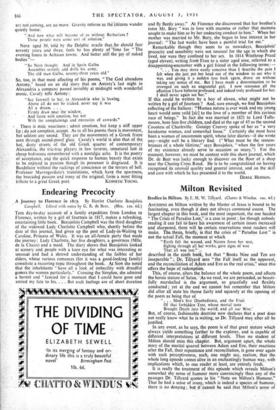Endearing Precocity
A Journey to Florence in 1817. By Harriet Charlotte Beaujolois Campbell. Edited with notes by G. R. de Beer.. (Bles. sos. 6d.) THIS day-to-day account of a family expedition from London to Florence, written by a girl of fourteen in 1817, makes a refreshing, entertaining little book. Beaujolois Campbell was the third daughter of the widowed Lady Charlotte Campbell who, shortly before the date of this journal, had given up the post of Lady-in-Waiting to Caroline, Princess of Wales. It was an all-female party that made the journey: Lady Charlotte, her five daughters, a governess (Mlle. de la Chaux) and a maid. The diary shows that Beaujolois looked at scenery and people with a keen eye for what was interesting or unusual and had a shrewd understanding of the, foibles of her elders, whose various romances (for it was a good-looking family) constitute a recurring topic throughout the book. At Sion she noted that the inhabitants " have all a loOk of imbecility with dreadful goiters the women particularly." Crossing the Simplon, she admired a hermit and " fancied for a moment that I -could have gone and united my fate to his. . . . But such feelings are of short duration
and fly fleetly away." At Florence she discovered that her brother's tutor Mr. Bury " was in love with mamma or rather that mamma sought to make him so by her endearing conduct to him.". When her mother was married to Mr. Bury, she began to lose interest in her journal: " The last weeks have been a painful trial- for me." Remarkable though they seem to us nowadays, Beaujolois' precocity and sensibility were not unusual for the age in which she lived, nor were they confined to her sex. In 1814 Winthrop Praed (aged eleven), writing from Eton to a sister aged nine, referred to a - disappointinpencounter with a girl friend in the following terms:—
. . . You may more easily conceive than I describe the pain I felt when she just put her head out of the window to see who it was, and giving it a sudden toss back again, drove on without taking any notice of me.— But I have made a determination to be revenged on such an ungrateful girl. I now renounce all the affection I have hitherto:professed, and indeed truly professed for her. I shall never again see her."
If this could be written by a boy of eleven, .what might not be written by a girl of fourteen ? And, sure enough, we find Beaujolois reflecting of the Italians: !`41uman nature is ever weak and my young heart would soon yeild [sic] to the love of a member of this curious race of beings." In fact she was married in 1821 to. Lord moore, bore him five children, and died at the age of 45 as the second Countess of Charleville. Gossipy Creevey spoke of her as " a very handsome woman, and somewhat loose." Certainly she must have been a woman of uncommon spirit, whose later diaries—if she wrote any—might well be a literary find. (" What must be the remem- brances of a whole lifetime," says Beaujolois, " when the few years of my existence already serve to occasion so many.") For the moment, however, we must be content with this short journal, which Dr. de Beer was lucky enough to discover on the floor of a shop near the Charing Cross Road. He is to be congratulated on having recognised its unusual quality and general interest, and on the skill and care with which he has presented it to the world.
DEREK HUDSON.






























 Previous page
Previous page